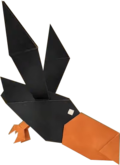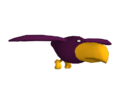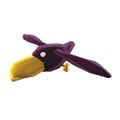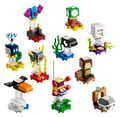Crowber
| Crowber | |
|---|---|
 In-game artwork of a Crowber from Dr. Mario World. | |
| First appearance | New Super Mario Bros. (2006) |
| Latest appearance | Mario + Rabbids Sparks of Hope (2022) |
Crowbers, also described as ravens,[1] are bird enemies first seen in New Super Mario Bros. These enemies tend to appear in the last courses of the game, where they attack Mario or any other potential victim with rather fast moves. Their name is a pun on "crowbar" and "crow".
History[edit]
Super Mario series[edit]
New Super Mario Bros.[edit]
Crowbers are only seen in World 8-1, where they swoop down to attack Mario. As progress is made throughout the course, more will appear and chase after the player. Crowbers attack quickly, making it somewhat difficult for the player to defeat them.
New Super Mario Bros. Wii[edit]
Crowbers reappear in the game New Super Mario Bros. Wii. They are redesigned with a purple plumage and a lighter beak and legs, and appear in World 7-![]() Ghost House and World 8-5. They attack in the same manner as they did in New Super Mario Bros.
Ghost House and World 8-5. They attack in the same manner as they did in New Super Mario Bros.
New Super Mario Bros. 2[edit]
Crowbers (referred to as Crows in the Prima guide)[2] reappear in New Super Mario Bros. 2. They appear in World ![]() Mushroom-
Mushroom-![]() Cannon, World 6-4 and in the first level of the Impossible Pack. They maintain their appearance from New Super Mario Bros. Wii. In the first of these levels, they always follow a preset movement pattern due to the automatic running, unlike their normal random movements.
Cannon, World 6-4 and in the first level of the Impossible Pack. They maintain their appearance from New Super Mario Bros. Wii. In the first of these levels, they always follow a preset movement pattern due to the automatic running, unlike their normal random movements.
Dr. Mario World[edit]
Crowbers make their debut in the Dr. Mario series in Dr. Mario World as obtainable assistants. In this game, they revert back to their black coloration. In stage mode, its effect is to increase the amount of capsules the player start with by one, where the chance of it happening is greater at higher levels. In versus mode, its effect is to reduce the speed the attack meter fills for both players by a percentage, meaning that the amount of points required to fill up the attack meter is increased by that percentage, rounded down to the nearest round number.
Paper Mario: The Origami King[edit]
Crowbers make their Paper Mario series debut in Paper Mario: The Origami King, where origami Crowbers appear as enemies. A single one appears in Scorching Sandpaper West, while three others are encountered on Bonehead Island. During battle, Crowbers will line up behind one another and attack Mario with a Beak Bomber move in succession, with a brief delay between each individual's attack.
Mario + Rabbids Sparks of Hope[edit]
In Mario + Rabbids Sparks of Hope, a single Crowber appears in Palette Prime flying around a large scarecrow in the Pumpkin Patch area.
Other appearances[edit]
A Toad Quiz in Mario & Luigi: Paper Jam has the enemy's name as one of the answers.
A Crowber is one of the figures in Series 3 of the Character Packs in the LEGO Super Mario line of merchandise.
Unused appearances[edit]
New Super Mario Bros. U[edit]
Crowbers were originally going to reappear in New Super Mario Bros. U, but were not used in the final product. They can be seen, however, in one of many unused stages. As seen in it, they were intended to act and attack like they did in previous New Super Mario Bros. installments.[3]
Paper Mario: Sticker Star[edit]
Crowbers were going to appear in Paper Mario: Sticker Star, but were cut from the game.[4]
Profiles and statistics[edit]
Dr. Mario World[edit]
- Stage mode: "Grants 30%/40%/50%/60%/70% chance of extra capsules (1) on stage start."
- Stage mode (Prior to version 2.3.0): "Grants 10%/20%/30%/40%/50% chance of extra capsules (1) on stage start."
- Versus mode: "Increases number of cleared pieces required to fill both your and your opponent's attack meters by 10%/20%/30%/40%/50%."
Paper Mario: The Origami King[edit]
| Paper Mario: The Origami King enemy | |||||||||||||||
|---|---|---|---|---|---|---|---|---|---|---|---|---|---|---|---|
| Crowber | |||||||||||||||

|
HP | 28 | Moves | Location(s) | |||||||||||
| Type | Flying | Beak Bomber (11), Bombs Away (?) | Scorching Sandpaper West, Bonehead Island | ||||||||||||
| Role | Common | ||||||||||||||
| Item drops | Mushroom | ||||||||||||||
|
|
They fly around in circles, ever in wait to dive-bomb Mario on sight, as though they have nothing better to do. | ||||||||||||||
Gallery[edit]
Model from the data of New Super Mario Bros. Wii
Additional names[edit]
Internal names[edit]
| Game | File | Name | Meaning
|
|---|---|---|---|
| New Super Mario Bros. New Super Mario Bros. Wii New Super Mario Bros. 2 |
data/enemy/crow.nsbmd 1 Data/files/Object/crow.arc romfs/Model/Enemy/crow.szs |
Crow | - |
Names in other languages[edit]
| Language | Name | Meaning | Notes |
|---|---|---|---|
| Japanese | クロスケー[5] Kurosukē |
From "crow" and「助」(-suke, used as a suffix in Japanese male names); with「ケ」elongated | |
| Chinese (simplified) | 回旋黑鸟[?] Huíxuán Hēiniǎo |
Roundabout Black Bird | |
| Chinese (traditional) | 回旋黑鳥[?] Huíxuán Hēiniǎo |
Roundabout Black Bird | |
| French (NOA) | Corbeq[?] | From "corbeau" (crow) and "bec" (beak) | |
| French (NOE) | Corbek[?] | From "corbeau" (crow) and "bec" (beak) | |
| German | Krähe[?] | Crow | |
| Italian | Cornacchio[?] | Masculine form of "cornacchia" (carrion crow) | |
| Korean | 까막[?] Kkamak |
From "까마귀" (kkamagwi, crow) | |
| Portuguese | Corvota[?] | From "corvo" (crow) and "gaivota" (gull) | |
| Spanish | Cuervajo[?] | From "cuervo" (crow) and "-ajo" (Spanish pejorative diminutive suffix) |
References[edit]
- ^ Bueno, Fernando (November 15, 2009). New Super Mario Bros. Wii PRIMA Official Game Guide. Prima Games (American English). ISBN 978-0-307-46592-4. Page 141 and 162.
- ^ von Esmarch, Nick (2012). New Super Mario Bros. 2 PRIMA Official Game Guide. Prima Games (American English). ISBN 978-0-307-89552-3. Page 33.
- ^ Skawo (April 22, 2019). [TCRF] - Unused New Super Mario Bros. U Deluxe Levels - Part 4. YouTube (English). Retrieved December 22, 2019.
- ^ TCRF. Paper Mario: Sticker Star § Enemies. The Cutting Room Floor (English). Retrieved July 3, 2024.
- ^ Shogakukan editors (2006). 「敵キャラクターリスト」in『ニュー・スーパーマリオブラザーズ: 任天堂公式ガイドブック』. Tokyo: Shogakukan (Japanese). ISBN 4-091063-07-1. Page 18.







